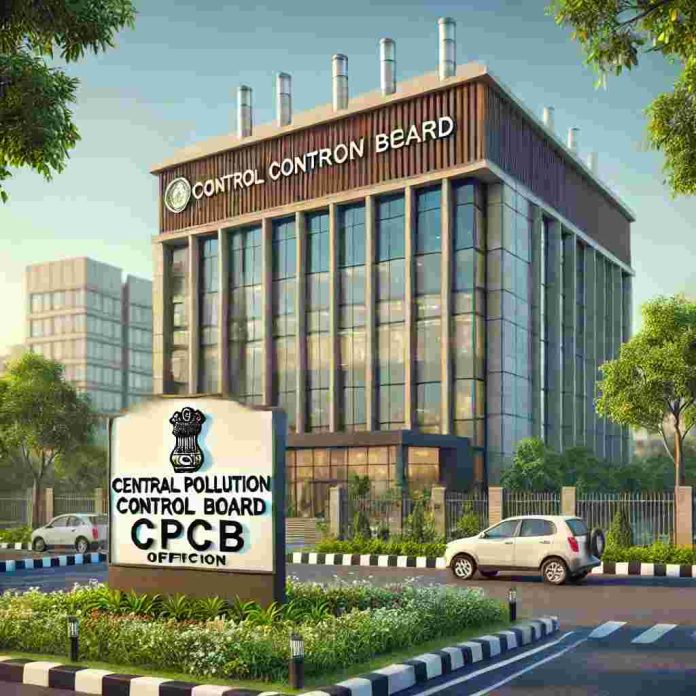The Central Pollution Control Board (CPCB) is an important body for environmental protection and pollution control in India. It was established in 1974 under the Water (Prevention and Control of Pollution) Act. The main objective of CPCB is to control water and air pollution and reduce its effects. In this article, we will discuss the functions, objectives, standard development activities of CPCB and its importance in detail .
Objective of CPCB
The main objective of establishing CPCB is to control water and air pollution in India.
Water (Prevention and Control of Pollution) Act, 1974: Under this Act, CPCB has been given powers for the prevention and control of water pollution.
Air (Prevention and Control of Pollution) Act, 1981: CPCB is also held responsible for the prevention and control of air pollution.
The function of CPCB is not only to control pollution but it also serves to spread awareness about the environment and educate people about its importance.
Major Functions of CPCB
CPCB has several major functions, which help it play a vital role in pollution control:
Prevention and Control of Water Pollution: CPCB works for cleaning and conservation of water sources in various states. It develops various plans and programmes to prevent water pollution.
Improving Air Quality: Another important function of CPCB is to improve air quality. It implements various measures to control air pollution.
Advising the Central Government: CPCB advises the Central Government on matters relating to control and prevention of water and air pollution.
Coordination with State Pollution Control Boards: CPCB coordinates the functions of other State Pollution Control Boards, provides guidance to them and assists in case of any dispute.
Standard Development Activities of CPCB
CPCB is also active in the development and revision of environmental standards.
Development of Environmental Standards: Central Pollution Control Board develops environmental standards for various industrial sectors. These standards help in maintaining water and air quality.
Commencement of Industrial Document: CPCB issues Commencement of Industrial Document (COINDS), which provides guidelines for managing industrial pollution.
Water and Air Quality Standards: CPCB lays down standards for water and air quality, which help in controlling pollution from various sources.
Standards Developed by CPCB
CPCB has developed several standards, which are important in pollution control:
National Air Quality Standards: CPCB has laid down air quality standards at the national level, which prescribe maximum permissible levels for various pollutants.
Water Quality Norms: CPCB has developed water quality norms from various water sources, which help in controlling water pollution.
Emission Standards of Industrial Pollutants: Central Pollution Control Board has developed standards for emission of pollutants from various industries, which are issued under the Environmental Protection Rules.
Standards for Treatment and Disposal of Bio-Medical Waste: CPCB has developed standards for treatment and disposal of bio-medical waste, which help in controlling pollution of healthcare facilities.
Importance of CPCB
The importance of CPCB is not limited to pollution control only, but it also plays an important role in spreading environmental awareness in the society.
Public Awareness: CPCB spreads public awareness through various programs and campaigns, so that people can understand the effects of pollution and improve their actions.
Policy Advice: CPCB advises the government in the formulation of policies, so that effective steps can be taken for environmental protection.
Research and Development: CPCB promotes research and development activities, which can lead to the development of new technologies and methods.
FAQs of CPCB
Que. What is CPCB?
Ans. CPCB, Central Pollution Control Board, is a premier body for controlling water and air pollution in India.
Que When was CPCB established?
Ans CPCB was established in 1974 under the Water (Prevention and Control of Pollution) Act.
Que What are the functions of CPCB?
Ans CPCB works to prevent water and air pollution, develop standards, and spread public awareness.
Que What is the importance of CPCB?
Ans CPCB’s importance lies in pollution control as well as environmental protection and public awareness.
Que What are the standards developed by CPCB?
Ans Central Pollution Control Board has developed water and air quality standards, industrial pollution emission standards, and treatment standards for biomedical waste.
Challenges of CPCB
CPCB faces several challenges, which can affect its functions:
Coordination across states: Coordination for pollution control across different states is a challenge, as every state has its own policies and priorities.
Lack of public awareness: Lack of awareness about pollution among people is also a big challenge, which makes it difficult to make CPCB’s efforts effective.
Lack of financial resources: CPCB needs adequate financial resources to perform its functions effectively, which are not always available.
Future direction of CPCB
The future of CPCB depends on several new initiatives and plans:
Use of new technologies: CPCB is using new technologies and methods.
CPCB is working towards improving pollution control in the country.
International cooperation: CPCB is working towards pollution control at the global level by collaborating with international organizations.
Sustainable development: CPCB is moving towards developing new policies for environmental protection by adopting the principles of sustainable development.
Conclusion
The Central Pollution Control Board (CPCB) is an important institution for pollution control and environmental protection in India. Its functions, objectives, and standard development activities help it play a major role in pollution control. The importance of CPCB is not only in controlling pollution but it is also important in spreading environmental awareness in the society. Its future direction is towards new technologies, international cooperation, and sustainable development, which will make it more effective.
Thus, the functions and objectives of CPCB are not only important in the present but will also remain essential for environmental protection in the future.
Also Read: Schools in Delhi shifted to hybrid mode amid rising air pollution





